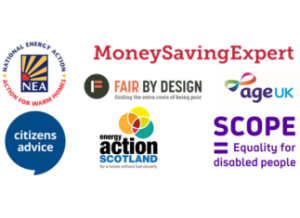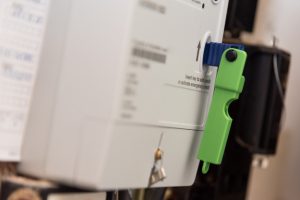Contact: Anna Cook, Head of Communications (anna.cook@nea.org.uk) Mobile: 07884 371913
New report reveals 3 million households will still be trapped in fuel poverty by 2030
• A new report launched this week by National Energy Action (NEA) and Energy Action Scotland (EAS) warns the UK government will miss a legal requirement on fuel poverty in England by a staggering margin.
• According to the authors 3 million households will be trapped in fuel poverty by 2030 – the same number who are currently in fuel poverty in England based on the UK government’s official definition.
• New independent analysis by Gemserv Ltd, also quantifies a ‘startling and widening’ £18 billion funding gap for the measures needed in fuel poor homes to meet this legal requirement in England by the end of this decade.
• The authors say the poorest households could be left paying on average, £480 more a year to meet their energy needs and trapped in cold, damp and unhealthy homes.
• The report also shows that action on the private rented sector, put off by the UK government last year, is critical.
• The Chair of the Energy Security and Net Zero Committee and the Chair of the UK government’s fuel poverty advisory group in England, the Committee on Fuel Poverty, provide their reactions to the analysis.
The UK Fuel Poverty Monitor report from National Energy Action (NEA) and Energy Action Scotland (EAS) sets out the urgent priorities for tackling fuel poverty in England and across the UK. Adam Scorer, Chief Executive of National Energy Action (NEA) says:
“Based on current ‘progress’ we estimate three million households in England alone will still be trapped in fuel poverty by 2030 – the same number who are currently in fuel poverty in England. Three million households left cold, damp and unhealthy. Governments risk missing their legal targets, but those living in fuel poverty are at risk of so much more.”
The Fuel Poverty Monitor contains a first-of-its-kind study independent analysis by Gemserv Ltd, of the cost and benefits of meeting the targets. It quantifies a funding gap of at least £18 billion for energy efficiency measures to meet the legal requirement to ensure fuel poor homes in England are brought up to a reasonable standard of energy efficiency by the end of this decade. Adam Scorer adds:
“Unlike the £40 billion spent last year to subsidise everyone’s energy bills, this funding is targeted and achievable from existing sources of revenue such as carbon taxes, VAT revenues or planned windfall taxes. Crucially, the benefits of positive action are double the costs. The quicker we act, the greater the benefits that are generated.”
The report shows that action on the private rented sector, put off by the UK government last year, is critical. Effective regulation on private and social landlords would reduce the investment gap to £10.8 billion of central investment required. In the private rented sector alone, this could remove almost two fifths of all households from fuel poverty in England by 2030. It could also add over £3 billion of capital value to private rented sector properties with fuel poor tenants, allowing landlords to recover the cost of their investment in energy efficiency measures through lower overall borrowing costs.
Caroline Flint, Chair of the Committee on Fuel Poverty (CFP) adds:
“The people most impacted by the ongoing energy crisis are the poorest households, trapped for too long, in the most expensive to heat homes. While we cannot control global energy prices, we can and must insulate vulnerable people from current and future energy shocks by investing in our housing stock. This report is a necessary and timely reminder that current plans to meet our legal target in England are insufficient. Strategies for fuel poverty must be kept updated and need to be far more ambitious. If we do, we can all do so much more to help those who cannot currently afford to keep warm every winter and whose health and well-being is currently in serious risk.”
Angus Brendan MacNeil MP, Chair of the ESNZ Committee, comments:
“As a committee, we have heard countless times about the energy crisis continuing to have a devastating effect on the most vulnerable in our society. Millions of the poorest households across the UK continue to be exposed to the worst of the crisis due to the low level of energy efficiency in their homes. This report should be a wake-up call to redouble our efforts. The potential for social, environmental and economic benefits through enhancing current efforts is vast.”
Although England is the only nation in the UK with an energy efficiency-based fuel poverty target, the report is the first to model the significant benefits that could be captured across the whole of the UK, if there were such targets elsewhere. The benefits span household financial savings, savings for the health sector, benefits to landlords, positive environmental impacts and benefits to the broader economy.
Frazer Scott, Chief Executive of Energy Action Scotland concludes:
“For two decades, we have published a yearly investigative report on progress to eliminate fuel poverty across the UK, but this year’s report is more important than ever. While fuel poverty is a complex problem, we can and must tackle fuel poverty in a sustainable way through greater deployment of energy efficiency. We are however at the very edge of a precipice. If we lack the resolve and conviction to act now, we will lock ourselves into a more expensive approach that won’t improve the lives of people across the country which can create savings for the health sector, generate benefits to landlords or lead to positive environmental impacts or support the broader economy.”
The report makes three key recommendations to ensure that the English fuel poverty target is met, with similar objectives achieved in the devolved nations:
1. Ambitious cross-departmental strategies to end fuel poverty are desperately needed.
The fuel poverty strategies that are in place across the UK nations have been overwhelmed by the scale of the energy crisis and must be updated. The impact of the crisis should be a vital catalyst to develop new, updated or more ambitious cross-departmental strategies across each of the UK nations. To abate endemic fuel poverty levels and generate the greatest benefits, the devolved nations should employ similar energy efficiency-based targets within their own strategies and plans. The charities say this is the most cost effective and sustainable way to keep people warm, safe and healthy in their homes.
2. Urgently raise the level of energy efficiency in the worst privately rented homes.
Two fifths of all fuel poor households in England are private renters and 37% of the most expensive to heat homes are in this tenure. The government’s legal fuel poverty target means by 2030, all fuel poor tenants should be able to live in a warm safe home. The UK government should extend Minimum Energy Efficiency Standards in the private rented sector up to energy performance rating C by 2030, alongside reintroducing tax allowances to incentivise private landlords to invest in their properties to meet the higher standards sooner. To enforce tenants’ right to a warm, safe and healthy home, they say central government and local authorities need to work closely together to ensure monitoring and enforcement is a resourced priority for all local authorities.
3. Central investment must be sufficient to meet legal requirements.
A minimum of £18 billion of energy efficiency measures needs to be invested into fuel poor households to meet the legal requirement to ensure all fuel poor homes in England are brought up to reasonable standard of energy efficiency by the end of this decade, once current and planned programmes are accounted for. This investment gap drops to £10.8 billion by 2030 if combined with effective regulations. Our analysis shows this investment pays for itself, with the key monetised benefits almost double the investment required. Crucially, earlier action to meet these legal requirements will generate the greatest benefits. The Treasury should commit up to £2 billion of central additional investment a year to cover the cost of energy saving measures to meet legal duties in England and extend current programmes. It should also undertake its own analysis on the full benefits of meeting these goals.
Each of these headline recommendations are explored in the full report, alongside what the priorities should be for a reinvigorated approach across the UK and within each nation.
The full report will be on our website at 5pm on 31 January here: www.nea.org.uk/publications/uk-fuel-poverty-monitor-national-energy-action-2022-23/.
ENDS
Notes to editors
1. National Energy Action (NEA), is the national fuel poverty charity, working across England, Wales and Northern Ireland, to improve the lives of people in fuel poverty. We directly support people with energy and income maximisation advice, and we advocate on issues such as the current energy crisis and the need to improve the energy efficiency of our homes. See: https://www.nea.org.uk/. Energy Action Scotland (EAS) campaigns for an end to fuel poverty in Scotland and is the only national charity with this sole remit. EAS aims to develop and promote effective solutions to the problem of cold, damp and expensive to heat homes.
2. Gemserv Ltd is an expert provider of professional services. Gemserv is at the forefront of developments in the energy transition, focusing on delivering meaningful impact and market transformation supporting the journey to a low carbon economy. They deliver impact working across projects, from implementation and policy delivery and management of trade associations through to education and communication about the environmental benefits of technologies. For media, please contact our EMEA, Jordan Shuttlewood, E: jordan.shuttlewood@gemserv.com and T: +44 203 934 3565.
3. The UKFPM report is based on a Call for Evidence (CfE), which gained responses from 136 respondents covering the breadth of the UK to obtain views on the success of current fuel poverty strategies and policies. To supplement this, NEA commissioned new analysis by Gemserv Ltd to understand the costs and benefits of meeting energy efficiency-based fuel poverty targets. The report also draws on the direct experience of people who are living through the crisis, with real-life experience of households contained as case studies that tell stories about their experiences of being in fuel poverty and accessing support.
4. The findings highlight the remaining benefits of meeting the 2030 fuel poverty target in England are vast, spanning household financial savings, savings for the health sector, benefits to landlords, positive environmental impacts and benefits to the broader economy. The key benefits are as follows:
• Total cumulative energy bill savings for households 2022-2030 £5bn
• Average yearly household energy bill savings £480 per year
• Value of increases to thermal comfort to the benefit of the health sector cumulative, 2022-2030 £0.8 bn
• Increased capital value of private rented properties £3bn
• Employment impact 22,000 full time jobs
• Reduced Imports – cumulative, 2022-2030 , 24 TWh
• Primary Energy Saved – cumulative, 2022-2030 43 TWh
• Reduced Carbon Emissions – cumulative, 2022-2030 8,200 tCO2e
• Improved Outdoor Air Quality – cumulative, 2022-2030 16,500 tNOx
5. As well as the benefits in England, the report also models the significant benefits that could be captured across the whole of the UK, if there were such targets elsewhere. Alongside the new modelling, the report profiles wider research also shows that reducing heating costs can extend the life chances for children and be transformative for householders’ health, well-being and can increase social capital.
6. Gemserv Ltd’s modelling has calculated the capital cost of energy efficiency measures needed to meet the target. The actual costs may however vary, depending on the number of fuel poor households each year between now and 2030, the effectiveness of targeting fuel poor households within any current or future programmes and the cost of any significant administration or ancillary work.
7. A £24k cost cap was also applied per property due limitations of the data used in the modelling, where costs beyond £24k were uncertain. The model therefore provides indicative costs for improving 90% of fuel poor homes to energy performance rating C. The modelling assumes £0.7bn ongoing annual fuel bill support after 2030 for fuel poor households that don’t reach EPC C via energy efficiency improvements. This may not be the optimum approach in real life, outside of a modelling environment, as it could leave those households in the worst performing homes behind and require ongoing yearly subsidy which is likely to be more expensive in the long-term. These issues are explored further within the report in the section on ‘reasonably practicable’.
8. On 18 December, UK government announced the details of £6bn in funding for decarbonising homes between 2025 and 2028, first announced in Autumn 2022. Among other elements, there will be additional funding for the Social Housing Decarbonisation Fund and a successor to the Home Upgrade Grant scheme. The government stated this will help 200,000 low-income households across different tenures, predominantly in social housing (the tenure with highest levels of energy efficiency).
9. NEA’s report is mainly focused on the delivery of energy efficiency, wider policy priorities include restating the commitment to consult on a new mandated energy social tariff from April 2024 and addressing a growing mountain of debt in the energy sector through a ‘help to repay’ scheme.















